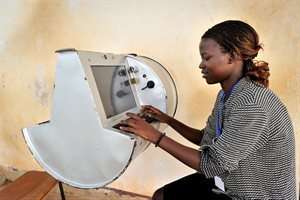New study reveals impact of technology for children in developing world

A new study by the ICT4D Centre at Royal Holloway, University of London, has revealed the significant impact information and communications technology (ICT) can have for child-related projects in developing countries.
The report, which has been developed in collaboration with UNICEF and Jigsaw Consult, is one of the most comprehensive studies in this field and will be launched by its lead author Dr Dorothea Kleine, Director of the ICT4D Centre, at a global conference at Harvard University today (Monday, 28 April).
The ICT4D Centre, which brings together expertise particularly from the Departments and Schools of Geography, Computer Science, Mathematics, and Management at Royal Holloway, was named as the world's 9th top Science and Technology think tank in the Global Go To Think Tank Index earlier this year.
"This major report will be relevant for policy makers at the highest level who are involved in international development and support poorer communities across the world, in places such as Asia, Africa and Latin America", said Dr Kleine, from the Department of Geography. "ICTs are not some sort of a technical fix detached from the complex realities of children's lives. They are increasingly woven into the very fabric of life, both in rich and increasingly in poor countries. Technology itself is only a small part of the overall challenge of social change processes for development."
The report, entitled 'Children, ICTs and Development: Capturing the potential, meeting the challenges' found that the use of technology, including mobile phones and social media, has spread rapidly across the globe, leading to an increase in efforts to use the power of communication and speedy access to information in order to aid development.
But while ICT can be extremely effective in addressing children's issues, the study also identifies certain challenges, such as when ICT development projects are planned in a top-down way, not paying sufficient attention to local context and results are not properly monitored. Summarising the evidence from 133 articles and 35 expert interviews, the report calls for an approach that is sensitive to factors such as gender and which works in participatory ways, often with children as co-designers of the projects.
More information: The report is available as a free e-book here: www.unicef-irc.org/
Provided by Royal Holloway, University of London




















